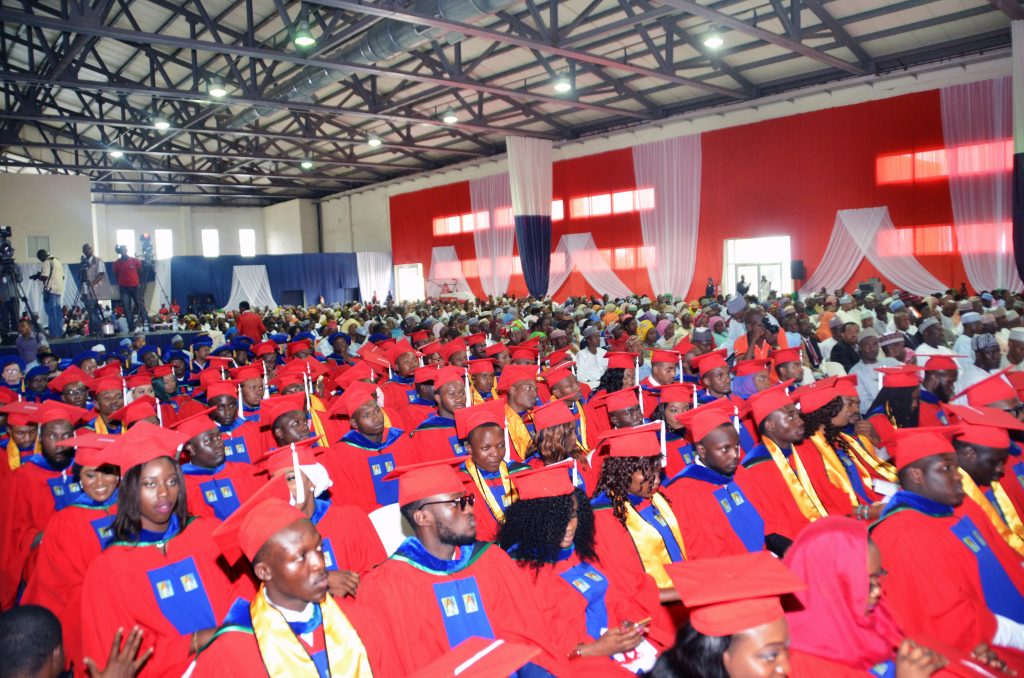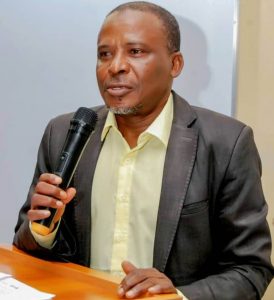AUN’s Leadership in ICT Education in Focus as Activities of 13th Commencement Begin
By Tina Bitrus
As preparations for activities of the 13th Commencement ceremonies of the American University of Nigeria begin, the University’s leadership and real influence in Information and Communication Technology will dominate issues to be discussed. A graduation event is a milestone for every institution, in part because it provides an opportunity to introduce a new set of highly skilled workers to the national economy.
The AUN Commencement ceremony scheduled for Saturday, May 21, 2022, will be exceptional. The graduating Class of 2022 is top-notch and industry-ready; it comprises very bright young men and women who have passed through a rigorous academic program in a liberal arts curriculum that inculcates critical thinking and problem-solving skills.
The keynote speaker will be the United States ambassador to Nigeria, Ms. Mary Beth Leonard, and dignitaries from within and outside Nigeria will be expected to add color to what promises to be a special day for the graduating students and their parents, friends, and families. The significance of the choice of the US Government’s representative in Nigeria as a Graduation Day speaker cannot be overemphasized. The University offers an American-style liberal arts education. Many AUN graduates have gone on to further studies at top-notch graduate schools in US/Canada such as Alberta, Columbia, Carnegie Mellon, Tufts, and Georgetown. Students enrolled in AUN can also choose to spend a semester or two in any US university or college that belongs to the 28-member Global Liberal Arts Alliance or the Association of American International Colleges and Universities. Dr. Ensign, the President of AUN, is an American, as are the Vice President for Residence Life and Student Affairs and head of Safety and Security.
President Ensign aptly described the symbolism of the scheduled visit of the Ambassador this way:
“Ambassador Leonard’s visit to the American University of Nigeria is a reminder of the close ties and shared values between our two countries committed to supporting education and democracy at a time when both are under threat in much of the world. We are honored to welcome her to our beautiful campus and look forward, as do our students, to her remarks on this important occasion.”
The AUN Commencement ceremony will also afford stakeholders another opportunity to assess the University’s contribution to the development of Nigeria’s Information Technology and Computing sector and the sterling rating of AUN graduates who have become a reference point for the industry. Stakeholders recall with pride the role of the American University of Nigeria in pioneering ICT education.
Nigerians are very familiar with Computer Science as a discipline, but in 2005, AUN was the first in Nigeria to introduce Software Engineering and Information systems at the undergraduate level following the ACM (Association for Computing Machinery) guidelines for Computing Curricula. The school graduated the first cohort of graduates in that field in 2009. Since then, the AUN School of IT & Computing (SITC) has been at the forefront of pushing and leading ICT education by producing quality graduates grounded in the fundamentals of computing, industry best practices, innovation, and research. Beginning from the fall 2022 semester, AUN will start offering B.Sc. and M.Sc. degrees in Data Science and Analytics, becoming the first and only Nigerian university to do so. The University is considered best equipped to lead Nigeria and sub-Sahara Africa’s Data Science and Analytics revolution in view of its infrastructural and human resource endowments.
The AUN Computing curricula are anchored on the best practices in the United States embodied in ACM Computing Curricula guidelines. The School is led by the Dean of SITC, Professor Matthias Fonkam. Fonkam joined the School in 2006 after a successful career in the software industry in Silicon Valley in the US and teaching and research experience in respected American universities and the Federal University of Maranhao in Brazil.
Originally from Cameroon, Dean Fonkam leads AUN’s highly-acclaimed global team of teachers, researchers, industry software practitioners, systems thinkers and mentors from India, Russia, US, UK, France and Africa to transform ICT education in Nigeria and sub-Saharan Africa.
“What attracted me to the AUN project was the mission of the University and the opportunity to help develop future leaders, innovators and entrepreneurs for Africa in the ICT space or leveraging ICTs. We are graduating innovators, entrepreneurs and researchers who are providing leadership in the ICT space and in fact making the most of ICT to help close not just the digital divide but also the income gap between Africa and much of the world.”
Dean Fonkam proudly touted the quality of the School’s graduates, many of whom have gone on to become ‘tech-prenuers,’ creating and running their own IT companies as CEOs or Chief Technology officers. Many others have successfully secured and completed master’s and doctorate programs at renowned universities in the UK such as Oxford, Manchester, Birmingham, Cardiff and other places like University of Solbridge in South Korea, University of Osaka Japan and University of Melbourne, Australia.
Having established and consolidated its position as a leading IT & Computing center of excellence in Nigeria and Sub-Sahara Africa, AUN is presently the preferred choice of young and bright Computer Science graduates from public and private universities in Nigeria seeking higher degrees to further their prospects.
“We have become that one-stop shop, not just for undergraduate but also for graduate computing degree programs. That’s the direction we plan to take, for the development of Africa. We are creating the foundation for future leaders in the IT & Computing industry and also future researchers in some of the emerging areas such as data science, machine learning, algorithms and complexity, artificial intelligence, information security and assurance, software applications development, and many other fields.”
Dean Fonkam describes the Computer Science, Software Engineering, and Information Systems programs at AUN as genuinely world-class. The curricula and teaching methods are geared towards producing graduates with both a solid foundation in computing and practical industry skills to take advantage of the growing global opportunities in the area. The university boosts a world-class computing infrastructure with 24/7 power, high bandwidth fiber-optic and wireless Internet Connectivity across the entire campus, and powerful data-center supporting a suite of server-based open-source applications assembled by SITC faculty and their students and which power the major operations of the university; an Enterprise Resource Planning system (OpenERP), the Canvas Learning Management System and a number of school and departmental portals to facilitate internal collaborations and empower more staff and faculty to contribute to the university’s content and presence on the web.
Dean Fonkam has explained that AUN’s approach to computing degree programs, especially the software engineering major, is unique not just in its liberal arts base but also in its greater emphasis on the practice and adoption of open-source software and developments – the broad aim being to cultivate and develop graduates who can leverage and adapt computing technologies (especially open source technologies) to the needs of Nigeria and Sub-Saharan Africa. The Dean also noted that the developing economies of Africa need brilliant and committed minds who can exploit the huge opportunities of ICTs as engines of the digital economy and even more importantly become agents of change pushing the boundaries in this field through relevant research and practice better adapted to Africa’s situation.
In this light Dean Fonkam proudly points out that his School of IT & Computing has always been at the forefront of developments in the computing degree curricula and its alignment with industry practice and trends. As an example, the SITC dean notes that for many years they have emphasized object-oriented thinking, design and programming in their computing degree programs but looking at trends in the computing field and practice, the functional thinking, functional design, and functional programming are set to dominate computing in the future. So SITC is well placed already emphasizing this emerging paradigm in its curriculum. The dean adds that the functional paradigm should help elevate computing to the same level as Mathematics: a generic tool and language for problem-solving by humans that is liberated from the limitations (wiring) of the hardware computer executing the solutions. This is a major limitation of the major programming paradigms including object-oriented programming that tend to force the problem-solver to think in ways more aligned with how the machine is wired than the very nature of the problem itself.
AUN now offers Master’s and Doctoral degrees in Computer Science and Information Systems. The University recently received the approval of the National Universities Commission (NUC) to introduce a hybrid mode option for its Master of Information and Communication Science (MICS) and Master of Technology and Wireless Technologies (MTWT) professional degrees.
Speaking about the relevance of SITC’s graduate programs in Nigeria’s computing landscape, Dean Fonkam is quick to note that currently they have several teaching staff from reputable Nigerian Universities such as ABU Zaria, BUK Kano, Adamawa State University in Mubi, and others, pursuing PhD programs in Computer Science and Information systems. The dean is proud of the quality of PhD students who have successfully defended their PhDs already, one of whom (Dr. Nasiru Yakubu) was recently hired as a Lecturer by a reputed UK University.
Tina Bitrus can be contacted though her email: [email protected]




